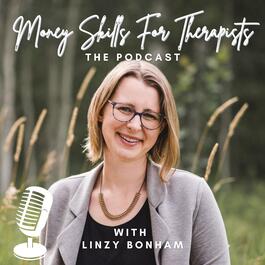
184: Financial Foundations for Therapists: Essential Jobs for Your Dollars
How much and how often should I be paying myself from my private practice? How can I effectively manage my business expenses? How much money should I spend on personal development each year? How much should I set aside for taxes? These are some of the most common questions I help therapists solve when they join my signature course, Money Skills For Therapists, and are looking to gain clarity into their business finances and create stability in their practices. In this podcast episode, I offer an in-depth overview of the various jobs your money must do, no matter how much of it you’re making or the size of your practice. But before we dive into the specifics of all these different jobs, the core concept that I want to leave you with today is that your money needs to take care of you. (00:22:52) “What you can control is what you are doing with your money. We need to focus on what is in our control.” — Linzy Bonham In our professions, we give so much time and energy to our clients. We're also natural caregivers to our children or our aging parents, or we’re giving to our community and our friends in all these other ways. We tend to be very giving, self-sacrificing humans. What’s important to remember is that when you build a business and start generating money, part of that business’ job is to take care of you so that you can keep showing up in life - both professionally and personally - and do the incredible work in the way that only you can do it.Establishing Clear Boundaries: Fixed vs. Variable Business Expenses The first step to making your money work for you is to identify business non-negotiables like taxes, rent, software, utilities, and other expenses that are required for you to conduct business. Many practice owners find it useful to use multiple bank accounts – one for each large expense group like taxes, business expenses, and payroll – to help manage and visualize how much money goes toward each category. For variable expenses, like personal development, getting clear on your budget, being strategic and making informed decisions can help prevent overspending funds you might need for license renewals or other necessary expenses. And rather than swiping cash from the business to pay your mortgage or other personal bills just before they’re due, you can begin to create stability and security in your personal financial life by having a clear and consistent amount deposited into your personal checking account each month as a regular, reliable paycheck that you and your family can depend on. (00:13:31) "Your business needs to be paying you regular, reliable paychecks that your family can depend on." - Linzy Bonham Optimizing Business Expenses for Private Practices (00:05:25) Separating Your Revenue into Necessary Expense Categories (00:07:17) Optimizing Business Expenses for Private Therapy Practices (00:10:35) Strategic Budgeting for Personal Development & Continuous Learning (00:13:37) Profit & Paycheck Systems That Create Financial Stability at Home (00:18:06) Establishing Expense Buffers to Sustain Your Practice During Rough Patches Action Steps for Therapists Who Want to Create Financial Stability with Their Private Practice If you’re ready to feel calmer and more confident with your business finances, here are a few small but powerful steps you can take: Open a dedicated bank account for taxes. Give your tax money a clear home so it’s always ready when you need it. Get clear on your...
From "Money Skills For Therapists"


Comments
Add comment Feedback